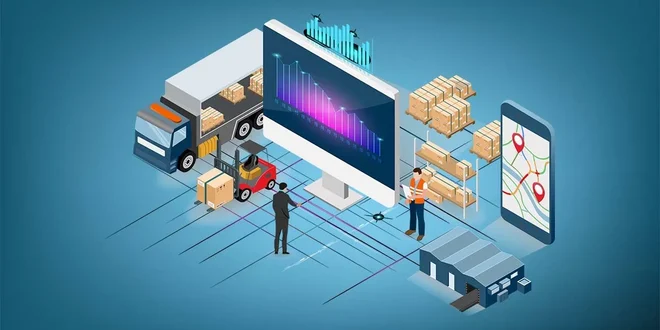Tech
The Role of Logistics Technology in Modern Businesses

Streamlining Operations with Logistics Technology
In today’s fast-paced business environment, the role of technology in logistics cannot be overstated. As companies strive for efficiency, cost-effectiveness, and improved customer service, logistics technology has emerged as a vital tool in achieving these goals. In this article, we will explore the significance of logistics technology, with a particular focus on Third-Party Logistics (3PL) software and the Warehouse Management System (WMS).
The Growing Importance of Logistics
Logistics is the backbone of any business that deals with physical products. It encompasses the entire process of planning, implementing, and controlling the efficient flow and storage of goods, services, and information from the point of origin to the point of consumption. In today’s global marketplace, where supply chains span across continents, effective logistics management has become a critical factor for success.
The Role of 3PL in Modern Supply Chains
Many businesses, especially smaller ones, rely on third-party logistics providers to handle various aspects of their supply chain. These 3PL companies offer specialized logistics services, such as transportation, warehousing, and order fulfillment, allowing businesses to focus on their core competencies.
Introducing Third-Party Logistics (3PL) Software
To manage these complex logistics operations efficiently, 3PLs often turn to specialized software solutions. Third-party logistics (3PL) software is designed to streamline and optimize various logistics processes. These solutions offer a range of benefits, including:
- Visibility:
3PL software provides real-time visibility into inventory levels, shipment status, and order fulfillment, enabling both 3PL providers and their clients to make informed decisions.
2. Efficiency:
Automation of routine tasks, such as order processing, inventory management, and route optimization, significantly improves operational efficiency, reducing costs and errors.
3. Scalability:
As businesses grow, 3PL software can easily scale to accommodate increased demand and complexity, ensuring seamless logistics operations.
4. Customer Satisfaction:
Enhanced visibility and efficiency lead to improved customer service, as businesses can fulfill orders faster and provide accurate delivery information to customers.
The Warehouse Management System (WMS) Explained
Within the realm of logistics technology, one crucial component is the Warehouse Management System (WMS). A WMS is a specialized software designed to manage and optimize warehouse operations. Let’s delve deeper into what a WMS is and why it’s essential for businesses today.
What is a Warehouse Management System (WMS)?
A Warehouse Management System (WMS) is a software solution that helps businesses effectively manage their warehouse operations. It serves as the central nervous system of a warehouse, orchestrating and optimizing various tasks, including:
Inventory Management:
WMS systems keep track of inventory levels, locations, and movements within the warehouse. This ensures that products are stored efficiently and can be easily located when needed.
Order Fulfillment:
WMS streamlines the order fulfillment process, from receiving orders to picking, packing, and shipping. It minimizes errors and maximizes efficiency in fulfilling customer orders.
Optimized Space Utilization:
WMS software helps warehouses make the most of their available space by organizing products in a way that maximizes storage capacity.
Inventory Accuracy:
With real-time tracking and automation, WMS reduces the risk of inventory discrepancies and stockouts, ensuring accurate stock levels.
Why Businesses Need a Warehouse Management System
The implementation of a Warehouse Management System can have a profound impact on a business’s bottom line. Here are some compelling reasons why businesses, particularly those with warehouses, should consider investing in a WMS:
1. Improved Efficiency:
WMS automates manual processes, reducing the time and labor required for tasks like order picking and inventory management. This leads to greater overall efficiency.
- Enhanced Accuracy:
By minimizing human errors, a WMS improves inventory accuracy, reducing costly mistakes in order fulfillment and stock management.
3. Real-Time Visibility:
Businesses gain real-time visibility into their warehouse operations, allowing for better decision-making, faster response to customer demands, and optimized resource allocation.
4. Scalability:
As businesses grow, a WMS can adapt and scale to accommodate increased demand and warehouse expansion.
5. Cost Savings:
Through better inventory control, reduced labor costs, and optimized space utilization, a WMS can lead to significant cost savings over time.
Conclusion:
In conclusion, logistics technology, including Third-Party Logistics (3PL) software and Warehouse Management Systems (WMS), plays a pivotal role in the success of modern businesses. It enables companies to streamline operations, enhance efficiency, and meet the ever-increasing demands of a global marketplace. Embracing these technologies is not just a choice but a necessity for those seeking to thrive in the competitive world of commerce.
-
Blog1 year ago
MyCSULB: Login to CSULB Student and Employee Portal – MyCSULB 2023
-
Android App3 years ago
Cqatest App What is It
-
Android1 year ago
What Is content://com.android.browser.home/ All About in 2023? Set Up content com android browser home
-
Software2 years ago
A Guide For Better Cybersecurity & Data Protection For Your Devices
-
Latest News2 years ago
Soap2day Similar Sites And Alternatives To Watch Free Movies
-
Android2 years ago
What is OMACP And How To Remove It? Easy Guide OMACP 2022
-
Android3 years ago
What is org.codeaurora.snapcam?
-
Business2 years ago
Know Your Business (KYB) Process – Critical Component For Partnerships





















